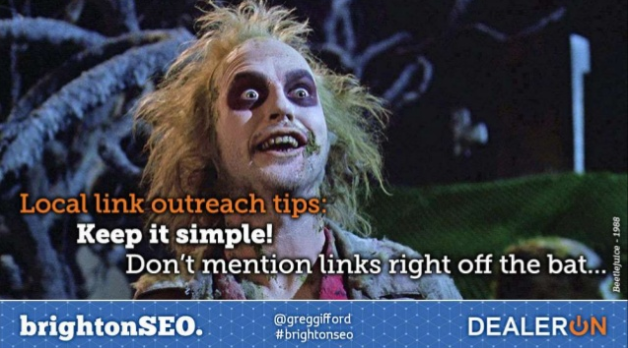Link-building is a tried and tested SEO tactic, and although there are a number of dubious ways to go about it, at base developing a strong link-building strategy is a smart and very necessary way to get your site ranked above your competitors.
This is particularly true of local SEO, where a few savvy tactics for building links and relationships with other local businesses can give you a huge visibility boost in local search.
According to the 2017 Local Search Ranking Factors, inbound links are the most important ranking signal.
But if you’ve run through all the usual methods of getting inbound links, what can you do to give your site – or your client’s site – a leg up in search?
At Brighton SEO last Friday, master of local SEO Greg Gifford shared some “righteous” tips for a kickass link-building strategy, in his signature flurry of slides and movie references – this time to 80s movies.

How link-building differs in local SEO
With local small businesses, said Gifford, you have to think about links in something other than pure numbers. Which is not to say that quantity doesn’t help – but it’s about the number of different sites which link to you, not the sheer number of links you have full stop.
With local SEO, all local links are relevant if they’re in the same geographical area as you. Even those crappy little church or youth group websites with a site design from the 1990s? Yes, especially those – in the world of local SEO, local relevance supersedes quality. While a link from a low-quality, low-authority website is a bad idea in all other contexts, local SEO is the one time that you can get away with it; in fact, these websites are your secret weapon.
Gifford also explained that local links are hard to reverse-engineer. If your competitors don’t understand local, they won’t see the value of these links – and even if they do, good relationships will allow you to score links that your competitors might not be able to get.
“It’s all about real-world relationships,” he said.
And once you have these relationships in place, you can get a ton of local links for less time and effort than it would take you to get a single link from a site with high domain authority.
So how should you go about building local relationships to get links? Gifford explained that there are five main ways to gain local links back to your business:
- Get local sponsorships
- Donate time or volunteer
- Get involved in your local community
- Share truly useful information
- Be creative in the hopes of scoring a random mention
Practical ways to get local links
These five basic ways of getting local links encompass dozens of different methods that you can use to build relationships and improve your standing in local search.

Here is just a sample of the huge list of ideas that Gifford ran through in his presentation:
Local meetups
Go to meetup.com and scout around for local meetups. A lot of local meetups don’t have a permanent location, which gives you an opportunity to offer your business as a permanent meeting venue. Or you can sponsor the event, make a small investment to buy food and drink for its members, and get a killer local link in return.
Local directories
Find local directories that are relevant to the business you’re working with. Gifford emphasized that these should not be huge, generic directories with names like “xyzdirectory.com”, but genuine local listings where you can provide useful information.
Local review sites
These are easier to get onto than bigger review websites, and with huge amounts of hyperlocal relevance.
Event sponsorships
Similar to sponsoring a local meetup, a relatively small investment can get you a great link in return. Event sponsorships will normally include your logo, but make sure that they also link back to your site.
Local blogs & newspapers
Local bloggers are hungry to find information to put on their blogs; you can donate time and information to them, and get a killer blog post and link out of the equation. The same is true of local newspapers, who are often stretched for content for their digital editions and might appreciate a tip or feature opportunity about a locally relevant business.
Local charities
Local charities are another way to get involved with the community and give back to it – plus, it’s great for your image. By the same token, you also can donate to local food banks or shelters, and be listed as a donor or sponsor on their website.
Local business associations
Much like local directories, it’s very easy to get listed by a local business association, such as a local bar dealer’s association – make sure there’s a link.
Local schools
These are great if you’re on the Board of Directors, or if your child or your client’s child is at that school. Again, getting involved in a local school is a good way to give back to the community at the same time as raising your local profile and improving your local links (both the SEO and the relationship kind).
Ethnic business directories
If you’re a member of a particular ethnic community who runs a local business, you can list your business on an ethnic business directory, which is great for grabbing the attention – and custom – of everyone in that community.
Of course, it goes without saying that you should only do this if it genuinely does apply to your business.

Gifford’s presentation contained even more ingenious ideas for local links than I’ve listed here, including local guides, art festivals and calendar pages; you can find the full list on his Slideshare of the presentation.
Gifford advises creating a spreadsheet with all your link opportunities, including what it will cost or the time it will take you. Make sure you have all of the relevant contact details, so that when it comes time to get the link, you can just go and get it. Then present that to your client, or if you’re not working on behalf of a client, to whichever individual whose buy-in you need in order to pursue a link-building strategy.
In fact, Gifford has even put together a pre-made spreadsheet ready for you to fill in, and you can download it here: bit.ly/badass-link-worksheet
Decide what links to go after, and go and get them; then, after three months, wipe the spreadsheet and repeat the process.
Some important points to bear in mind
So, now you’re all set to go out and gather a cornucopia of local links, all pointing right at your business, right? Well, here are a few points to bear in mind first.
A lot of times, the people you approach won’t know what SEO is, or even what digital is. So be careful about how you go about asking for a link; don’t mention links or SEO right off the bat. Instead, focus on the value that will be added for their customers. “This is not about the link; this is about the value that you can provide,” said Gifford.

Once again, for the people at the back: it’s about building up long-term, valuable relationships which provide benefit to you and to the local community. When it comes to local SEO, these relationships and the links that you can get will be worth more than any links from big, hefty high-domain-authority (but locally irrelevant) websites.
Or in Gifford’s words: “Forget about the big PR link shit. Go really hard after small, local links.”



